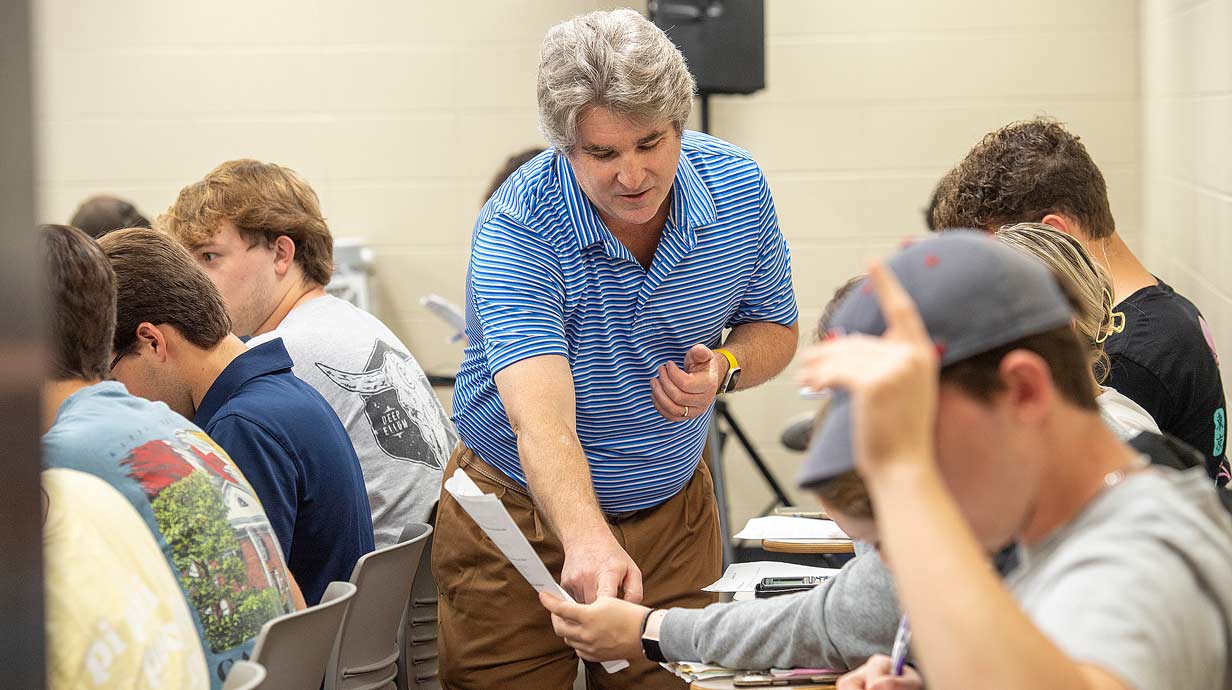
About the Doctor of Arts in Chemistry
The Department of Chemistry & Biochemistry in the College of Liberal Arts offers the D.A. in Chemistry to students whose goal is a career of teaching at two-year or four-year colleges. This chemistry degree is an alternative to doctoral degrees in science education.
The Value of a Doctorate Degree in Chemistry
The D.A. in Chemistry program prepares students to be broadly competent in the field of chemistry and provides them with skill in effective classroom and laboratory teaching.
On this Page…
Program Information
Degree
D.A. in Chemistry
Required Credit Hours
48
Program Type
Doctorate Program
Program Location
School
Have questions about the doctorate in Chemistry?
We're here to help. Don’t hesitate to get in touch if you need any assistance!
Ryan Clifton Fortenberry
Associate Professor of Chemistry and Biochemistry
D.A. in Chemistry Program Details
Learn about the application process, academic requirements, financial support, and the facilities available to you.
APPLICATION DEADLINE: December 7
The Department of Chemistry & Biochemistry welcomes student applications.
- Complete the Graduate School's Online Application.
- Upload Supplemental Application materials for the Department of Chemistry and Biochemistry to the link provided by the online application.
To be admitted to a graduate degree program in full standing, a student must have completed a B.S. degree in chemistry with an average grade of B. Exceptionally qualified students who have not completed a B.S. degree in chemistry but have a degree in a related field (such as biology, engineering, physics, pharmacology, or pharmacy) may be admitted. However they should expect to present a clear case in their personal statement for admission. Additionally, they should expect to be provisionally admitted until specified conditions are satisfied such as prerequisite coursework or other expectations.
Students in the D.A. in Chemistry program complete a minimum of 48 credit hours of graduate courses.
- Chem 512: Adv Instrumental Analysis
- Chem 527: Adv Organic Chem - Structure Mechanism
- Chem 531: Adv Physical Chem - Quantum Chem
- Chem 700: Intro to Graduate Research (3 hours)
- Chem 701: Adv Inorganic Chemistry I
- Chem 771: Biochemistry I
- 6 hours chosen from
- Chem 519: Chemical Separations
- Chem 532: Chemical Thermodynamics
- Chem 544: Chemical Applications of Group Theory
- Chem 563: Applied Spectroscopy
- Chem 545: Chemical Literature
- 3 hours of seminar
- 6 hours of related science (from two sciences)
- 6 hours of education courses emphasizing curriculum and course development
- 4 hours of instructional internship (Chem 717)
- 6 hours of doctoral thesis (Chem 796)
Comprehensive Examination: The student must successfully complete a comprehensive examination in general chemistry.
Doctoral Thesis: The doctoral thesis may be experimental in nature or an analysis of literature data; it may be in the area of chemical education, environmental chemistry, consumer products, materials science, or other research topics. The thesis must give rise to at least one manuscript submitted for publication.
Final Oral Examination: Satisfactory performance on an oral examination completes the graduate degree.
Teaching and research assistantships are available to qualified applicants. Students with a graduate assistantship funded in the department receive
- a scholarship that covers some or all of the tuition and non-residency fee, if applicable, for regular semesters
- subsidized health insurance.
For more information visit the Graduate Programs webpage on the Department's website.
The Graduate School's financial aid webpage also lists a variety of funding possibilities.
The Department of Chemistry and Biochemistry is located in Coulter Hall, which houses teaching and research laboratories and a machine shop including glass blowing equipment.
The Science Library, housed in the Thad Cochran Research Center adjacent to Coulter Hall, contains more than 20,000 chemistry books and journals and subscribes to more than 140 chemistry research journals.
The department also benefits from the presence of several other on-campus research programs, groups, and facilities, including
- Mississippi Center for Supercomputing Research
- National Center for Physical Acoustics
- National Center for Natural Products Research
- School of Engineering
- Nano-Bio ImmunoEngineering Consortium (NIEC)
About the Department of Chemistry and Biochemistry
Department Video
Hear firsthand from students and faculty about the Chemistry program.Next Steps
Explore Affordability
We have a variety of scholarships and financial aid options to help make college more affordable for you and your family.
Apply to the University of Mississippi
Are you ready to take the next step toward building your legacy?
